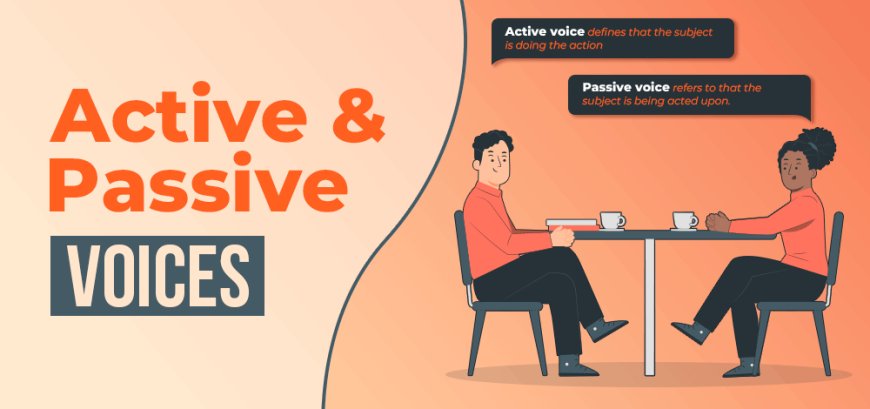Active and Passive voice -Rules of changing with examples.

The voice of a verb
The voice of a verb refers to whether the subject of the sentence is performing the action (active voice) or receiving the action (passive voice). It determines the relationship between the subject and the verb in a sentence. The voice of a verb can be either active or passive.
Active Voice: In active voice, the subject of the sentence performs the action expressed by the verb. It is the most common and straightforward form of expressing actions. For example:
- "She wrote a letter." (Subject: She, Verb: wrote)
Passive Voice: In passive voice, the subject of the sentence receives the action expressed by the verb. The focus is on the receiver of the action rather than the doer. Passive voice is formed using the appropriate form of the auxiliary verb "to be" and the past participle of the main verb. For example:
- "The letter was written by her." (Subject: The letter, Verb: was written)
Now, read these sets of sentenses
- The doctor treated the patient. (active)
- The patient was treated by the doctor. (passive)
- R K Narayan wrote The Guide. (active)
- The Guide was written by R K Narayan. (passive)
Here are a few key points to remember about active and passive voice:
- Active voice is generally more direct, clear, and concise, making it the preferred choice in most cases.
- Passive voice is used when the focus is on the recipient of the action or when the doer of the action is unknown or unimportant.
- Passive voice is often used in formal or scientific writing to maintain objectivity and emphasize the action rather than the doer.
- To convert an active voice sentence to passive voice, you typically reverse the subject and object positions and change the verb form to the past participle (often with the auxiliary verb "to be").
- Not all sentences can be converted into the passive voice. The possibility of creating a passive voice sentence depends on the transitivity of the verb and the availability of a suitable object.
The Rules of changing a sentence from the active voice to the passive voice
To change a sentence from active to passive voice, you can follow these general rules:
1. Change the object into the subject and the subject into the object. For example,
- Rohit buys a book. (active) -A book is bought by Rohit. (passive)
2. Change the main verb from its active form to the past participle form. The past participle is often formed by adding "-ed" to regular verbs or using the third form of irregular verbs.
- Rohit buys a book. (active) - A book is bought by Rohit. (passive)
- Rohit bought a book. (active) - A book was bought by Rohit. (passive)
3. Add the preposition "by" before the doer of the action (optional). The doer of the action can be mentioned in the passive voice sentence, but it's not always necessary or desirable.
- Minu has bought this pen (active) - This pen has been bought by Minu. (passive)
4. When we change a sentence from the active to the passive voice, the subject pronoun change to object pronouns. Similarly the object pronouns take the place of the subject and change to subject pronouns. For example,
- I gave her this pen drive. (active) - This pen drive was given to her by me. (passive)
- They will give him a cricket set on his birthday. (active) - He will be given a cricket set by them on his birthday. (passive)
Change in pronouns when we change a sentence from the active to the passive voice.
|
Subject pronoun in active voice |
Object pronoun in passive voice |
|
he |
him |
|
she |
her |
|
I |
me |
|
they |
them |
|
we |
us |
- Ravi takes care of his brother. (active) - His brother is taken care of by Ravi. (passive)
6. A question, when changed to passive voice, retains its form. Only the form of the verb and the pronoun change. For example,
- When did they invithe you? (active) - When were you invited by them? (passive)
- Is he disturbing you? (active) - Are you being disturbed by him? (passive)
Forms of Active And Passive Voice For All Tenses with examples
|
Tense |
Active voice |
Passive voice |
|
Simple Present Tense: |
She writes a letter. They play soccer. |
A letter is written by her. Soccer is played by them. |
|
Present Continuous Tense: |
He is writing an email. We are watching a movie. |
An email is being written by him. A movie is being watched by us. |
|
Present Perfect Tense: |
She has finished her homework. They have eaten dinner. |
The homework has been finished by her. Dinner has been eaten by them. |
|
Present Perfect Continuous Tense: |
They have been studying for hours. I have been waiting since morning. |
Hours have been being studied by them. Waiting has been being done by me since morning. |
|
Simple Past Tense: |
He fixed the car. They visited their grandparents. |
The car was fixed by him. Their grandparents were visited by them. |
|
Past Continuous Tense: |
She was singing a song. They were playing tennis. |
A song was being sung by her. Tennis was being played by them. |
|
Past Perfect Tense: |
They had already left. She had finished her work. |
The departure had already taken place. The work had been finished by her. |
|
Past Perfect Continuous Tense |
He had been working all day. They had been waiting for hours. |
Work had been being done by him all day. Hours had been being waited for by them. |
|
Simple Future Tense: |
We will start a new project. He shall visit his parents. |
A new project will be started by us. His parents shall be visited by him. |
|
Future Continuous Tense: |
She will be traveling tomorrow. They will be studying for the exam. |
Traveling will be being done by her tomorrow. The exam will be being studied for by them. |
|
Future Perfect Tense: |
He will have completed the task by then. They will have achieved their goal.
|
The task will have been completed by him by then. The goal will have been achieved by them. |
|
Future Perfect Continuous Tense: |
We will have been working for 10 hours. She will have been waiting for a long time. |
10 hours will have been being worked by us. A long time will have been being waited for by her. |
What's Your Reaction?






















































